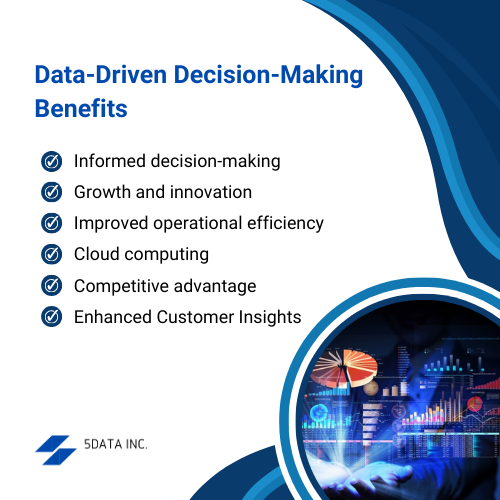In the modern era, businesses are continually amassing substantial volumes of data in a data-centric environment. However, the mere accumulation of data is not adequate for achieving success. To fully capitalize on the potential of their data assets, organizations require a well-defined data strategy. A data strategy serves as a blueprint for effectively utilizing data, empowering businesses to make well-informed decisions, optimize processes, gain a competitive advantage, and foster innovation.
What we cover in this blog
Key Takeaways
- Unleashing the power of data analytics
- Understanding customer behavior and preferences
- The role of data analytics
- Optimizing operational efficiency
Data-Driven Decision-Making Benefits
Leveraging data for perfect data analytics and data quality not only generates accurate predictive analytics and drives resource utilization but also mitigates risks, enabling businesses to achieve desired business outcomes and changing market dynamics. Data collection and data management service providers provide organizations with the necessary insights and validation processes to make data-driven decisions.a. Informed decision-making:
Developing and implementing a data strategy empowers businesses to make decisions based on data analysis. By analyzing relevant data, organizations gain valuable insights into market trends, customer behavior, and operational efficiency. This strategy enables firms to leverage data to make informed choices about product development, resource allocation, marketing strategies, and more. Data-driven strategic decision-making minimizes guesswork and increases the likelihood of achieving positive outcomes.b. Growth and innovation:
Data serves as a crucial asset that propels innovation and propels the expansion of businesses. Through the implementation of advanced data analytics, improved data quality, and a robust data strategy, organizations can unveil concealed patterns and correlations that could result in groundbreaking discoveries or the introduction of new products and services. By leveraging the power of data analytics, firms can discern emerging market trends, pinpoint customer pain points, and unearth untapped opportunities. This data strategy enables businesses to maintain their position at the forefront of innovation, explore novel revenue streams, and cultivate sustainable growth.c. Improved operational efficiency:
An effective data strategy is fundamental for optimizing business operations and enhancing overall efficiency. By organizing, collecting data, capturing, and analyzing data, businesses can identify potential roadblocks, fine-tune workflows, and pinpoint areas for enhancement. Adopting a data-driven approach empowers businesses to eradicate inefficiencies, reduce expenses, and elevate productivity. Harnessing the power of data to automate tasks and streamline processes enables organizations to direct their resources toward achieving core business objectives.d. Cloud computing:
Cloud’s competitive edge enables data integration and optimizes solution development and application capabilities to meet business needs. Software application development company helps businesses integrate data through the cloud.e. Competitive advantage:
A well-crafted data strategy has the potential to offer a substantial competitive advantage. By effectively harnessing data, businesses can gain invaluable insights into market trends, spot emerging opportunities, make marketing strategies, and foresee customer needs. This proactive approach to decision-making, made possible by a comprehensive data strategy, empowers businesses to stay ahead of the competition, make strategic moves, and adapt to evolving market dynamics to gain a significant competitive advantage and edge in the industry.f. Enhanced Customer Insights:
Understanding customers is essential for the success of any business. A well-crafted data strategy is key to effectively collecting and analyzing customer data. Businesses can mine historical data to gain valuable input into their target audience by capturing and analyzing customer preferences, feedback, and behavior patterns. This knowledge can be used to enhance customer experiences, personalize marketing campaigns, and develop products or services that precisely meet customer needs. Implementing a robust customer data strategy can help businesses cultivate stronger relationships with their customers, ultimately leading to improved customer satisfaction and loyalty. Data life cycle management services provide valuable insights through expertise in advanced analytics and the integration of data capabilities.
Data TrendsData strategy is a vital aspect of modern businesses. Here are some key trends in data strategy that have been shaping the landscape:1. Data Governance and Privacy
Implementing data privacy regulations such as GDPR and CCPA, organizations are placing more emphasis on data governance practices to ensure compliance, data quality, and security.2. Cloud-Based Data Management
Organizations are cloud computing their data for flexibility, scalability, and cost-effectiveness. Cloud-based data solutions are widely accepted for data storage, processing, and analytics.3. Data Democratization
Organizations are working to enhance data accessibility for a broader range of employees. This trend involves empowering non-technical users to access and use data for decision-making through self-service analytics tools and data visualization platforms.4. AI (artificial intelligence) and ML(machine learning)
ML and AI technologies are being increasingly integrated into data strategies to automate processes, derive insights from data at scale, and drive predictive analytics. This trend includes the adoption of AI-driven analytics tools and the use of ML algorithms for data analysis.5. Data Ethics and Responsible AI
As the use of data and AI becomes more widespread, there is a growing emphasis on ethical considerations in data strategy. Organizations are focusing on ensuring fairness, transparency, and accountability in their data practices to build trust with customers and stakeholders.6. Real-time data analytics
With the need for faster decision-making, organizations are investing in real-time data analytics capabilities. Real-time data processing and analytics enable organizations to react quickly to changing conditions and make timely decisions based on up-to-date information.7. Data collaboration and partnerships
Collaboration between organizations to share data and insights is becoming more common. By partnering with other companies, organizations can gain access to new datasets, expand their analytical capabilities, and drive innovation through data sharing.8. Data security and cybersecurity
As data becomes increasingly valuable, organizations are investing in robust data security measures to protect against cyber threats and data breaches. Data security is a critical component of data strategy, ensuring the confidentiality, integrity, and availability of data assets.These trends highlight the evolving nature of data strategy in response to technological advancements, regulatory requirements, and changing business needs. Organizations that keep up with these trends and adjust their data strategies are better positioned to leverage data for a competitive edge.Conclusion
In today’s fast-paced and interconnected world, businesses must recognize the pivotal role of a well-crafted data strategy in shaping their long-term success. By leveraging data effectively, organizations can make well-informed decisions, streamline operations, gain profound insights into customer behavior, and maintain a strong competitive position in the market. A comprehensive data strategy not only fuels innovation but also propels business growth and expansion, paving the way for sustained success in the future. Embracing a data-driven approach is no longer merely a choice but an essential step for organizations aiming to thrive in an ever-progressing business environment. Through a robust data strategy and data governance practices, businesses can unlock the full potential of their data resources and strategically position themselves for enduring prosperity.Frequently Asked Questions
What is the power of data in business?
The use of statistical analyses is highly valuable for companies. By conducting data analysis, businesses can uncover crucial insights into trends that impact strategic decision-making. The process of transforming raw numbers into meaningful data forms the cornerstone of effective decision-making.How can businesses benefit from data?
Information can aid in problem-solving. Monitoring and evaluating business process performance helps pinpoint performance issues and enhance overall performance.How do you maximize the value of your data?
The value of data can be maximized by fully understanding it and utilizing a set of tools and techniques for efficient processing and analysis.What does data-driven do with data, and how does it help a company?
Data-driven decision-making involves using data to inform and validate decisions before committing to them. It includes collecting survey responses to identify customer preferences, conducting user testing to identify potential issues, testing launching products or services, and analyzing demographic shifts for business opportunities or threats.How does data help understand customer behavior and preferences?
The company’s ability to tap into the vast data collection to provide unique insights into its customers. Get information about customer behavior by collecting information and then analyzing it in detail. So you can tailor your business services and marketing accordingly and improve customer satisfaction.

About the Author...
Aparna Sushumna, a mother to a hyperactive toddler who is all over the house. I aspire to be a decent content developer. A Bachelorette of technology says my qualification but I anticipated being a singer. Thanks to the recession, I dwelled into various jobs, from coding to being a tech support executive to a help desk professional, only to conclude that there is something else I wish to do. Here I am to accomplish my profound passion for content writing. Music, nature, jewelry, beauty, mythology, life quotes, celebs, and their life, being my areas of interest.
